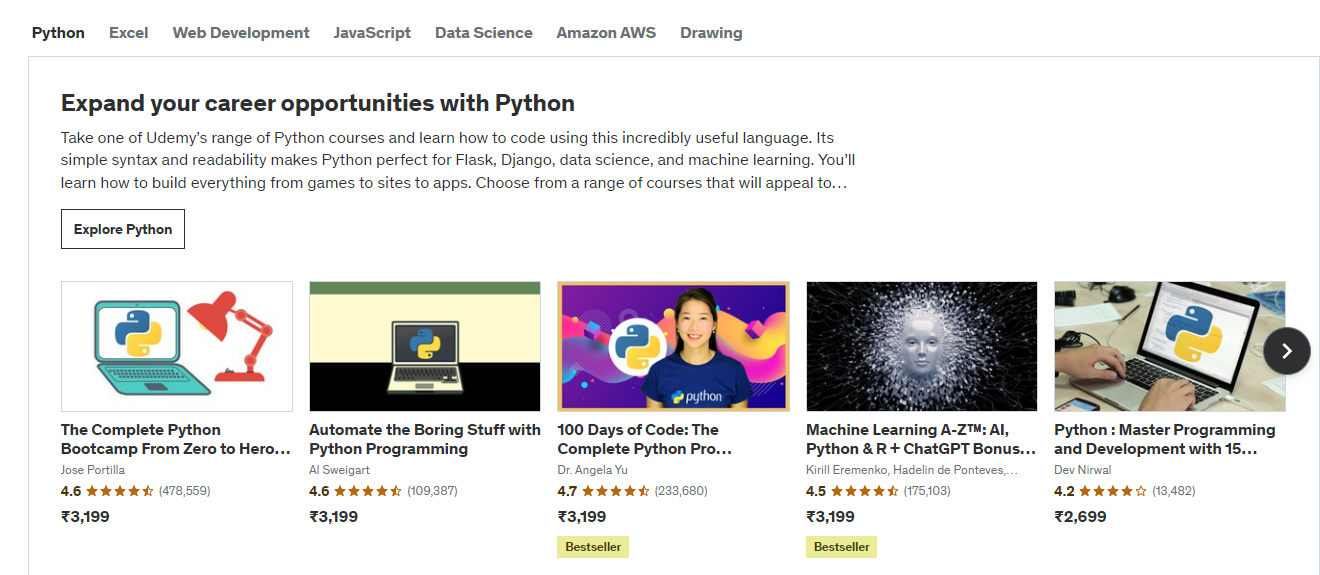In today’s rapidly evolving world, continuous learning is essential for personal and professional growth. With the abundance of online resources, e-learning has become a convenient and effective way to acquire new skills and knowledge. To help you navigate through the vast sea of options, we’ve compiled a list of the ten best websites for e-learning in 2023. Whether you’re looking to advance your career, explore a new hobby, or simply satisfy your intellectual curiosity, these platforms offer top-notch courses and resources to meet your needs.
1. Coursera (www.coursera.org)

Coursera is a leading online learning platform offering a wide array of courses from renowned universities and organizations worldwide. With topics ranging from computer science to humanities, Coursera provides both free and paid courses, allowing you to learn at your own pace.
Coursera is an online learning platform that offers a wide range of courses and specializations in various fields, including technology, business, arts, health, and more. Founded in 2012, Coursera partners with leading universities and organizations worldwide to provide high-quality educational content accessible to learners globally.
Prices:
- Audit Courses for Free: Coursera allows users to audit many of its courses for free, providing access to course materials but without graded assignments or a certificate.
- Coursera Plus (Subscription): Priced at approximately $399/year, Coursera Plus provides unlimited access to over 90% of the courses on the platform, including certificates.
- Individual Course Payments: For learners who do not opt for Coursera Plus, courses can be purchased individually. Prices vary widely depending on the course, ranging from $39 to $99 on average.
Pros:
- Global Access: Coursera provides access to courses from top universities and institutions worldwide, allowing learners to access high-quality education regardless of their geographical location.
- Diverse Course Catalog: Coursera offers a wide range of courses spanning various disciplines, ensuring there is something for everyone, from computer science to humanities.
- Flexible Learning: Courses are designed to accommodate different learning styles and schedules, with options for self-paced learning and deadlines for graded assignments.
- Certificates and Specializations: Completing a course on Coursera often awards a certificate, which can be a valuable addition to a resume. Specializations, which are a series of related courses, offer a deeper dive into a subject.
- Community and Networking: Learners have the opportunity to engage in discussions, forums, and peer reviews, creating a sense of community and facilitating networking.
Cons:
- Cost of Specializations: While individual courses can be audited for free, participating in Specializations or earning certificates often requires payment, which can add up if pursuing multiple courses.
- Limited Interactivity: Depending on the course, the level of interactivity and personal engagement with instructors can vary, potentially impacting the depth of learning.
- Dependence on Internet Connectivity: Access to Coursera requires a stable internet connection, which can be a limitation for learners in areas with limited or unreliable internet access.
- No Traditional Accreditation: While Coursera certificates can be valuable for personal development and skill-building, they may not carry the same weight as degrees or certifications from traditional institutions in certain professional settings.
2. Udemy (www.udemy.com)
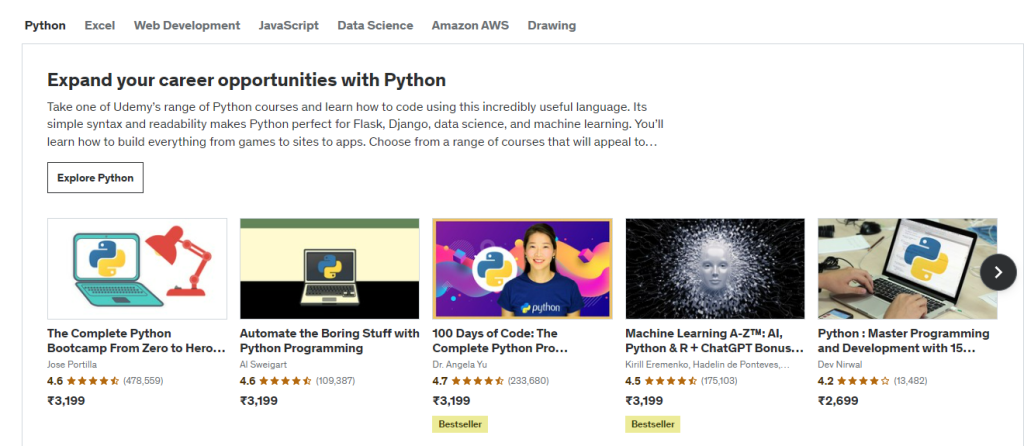
Udemy is a user-friendly platform that hosts over 155,000 courses on various subjects, taught by experts in their respective fields. It’s an excellent choice for those looking for practical, skill-based courses like programming, photography, marketing, and more.
Udemy is an online learning platform founded in 2010 that offers a wide array of courses covering various subjects and skills. It provides a diverse range of content, including video lectures, quizzes, and assignments, allowing learners to acquire new skills or deepen existing knowledge in their chosen fields.
Prices:
Udemy operates on a course-by-course pricing model. The cost of courses can vary widely depending on factors like the subject, depth of content, and instructor reputation. Prices typically range from $9.99 to $199.99, but there are often discounts and promotions, which can significantly lower the price. Additionally, Udemy offers a subscription service called Udemy Pro, which grants access to a selection of their courses for a monthly fee.
Pros:
- Diverse Course Catalog: Udemy boasts a vast library of courses, covering a wide range of topics from programming and business to arts and lifestyle.
- Affordable Entry Point: The platform often offers courses at a fraction of the cost of traditional education, making it accessible to a broad audience.
- Self-Paced Learning: Students can learn at their own pace, allowing for flexibility in scheduling and accommodating different learning styles.
- Lifetime Access: Once a course is purchased, students have lifetime access to the content, including any future updates or additions.
- Global Instructor Community: Courses are taught by experts and professionals from around the world, offering diverse perspectives and expertise.
Cons:
- Variable Course Quality: The quality of courses can vary significantly depending on the instructor. Some courses may be outdated or lack depth.
- Lack of Formal Credentials: Udemy does not provide accredited degrees or certificates, which may be a drawback for those seeking formal recognition for their learning.
- Limited Interactivity: While there are quizzes and assignments, the level of interactivity may not match that of live, in-person classes or more advanced e-learning platforms.
- Inconsistent Learning Experience: Since courses are created by different instructors, there may be differences in teaching styles, video quality, and overall presentation.
- No Personalized Learning Paths: Unlike some other platforms, Udemy does not offer personalized learning paths based on individual goals and prior knowledge.
3. edX (www.edx.org)

Founded by Harvard University and MIT, edX offers high-quality courses from prestigious institutions around the globe. The platform focuses on university-level courses and includes a mix of free and paid options.
edX is an online learning platform that offers a wide range of courses and programs from universities and institutions around the world. Founded in 2012 by Harvard University and the Massachusetts Institute of Technology (MIT), edX is a non-profit organization dedicated to providing high-quality education accessible to a global audience. The platform covers diverse subjects including computer science, business, humanities, science, engineering, and more.
Prices:
- Audit (Free): Many courses can be audited for free, allowing learners to access course materials and content without earning a certificate.
- Verified Certificate (Paid): This option provides learners with a verified certificate upon completion of the course. Prices vary depending on the course and range from approximately $50 to $300 or more.
- MicroMasters Programs (Paid): These are series of graduate-level courses that culminate in a MicroMasters credential. Prices can range from $800 to $2,000 or more for the entire program.
- Professional Certificate Programs (Paid): These are focused programs designed to help learners acquire job-relevant skills. Prices can range from $200 to $600 or more.
- XSeries Programs (Paid): These are in-depth series of courses that lead to a specific certification. Prices vary widely depending on the program.
- Master’s Degree Programs (Paid): edX also offers full master’s degree programs from universities and institutions. Prices for these programs can range from a few thousand dollars to over $20,000.
Pros:
- High-Quality Content: Courses are developed by renowned universities and institutions, ensuring a high standard of education.
- Flexibility: Learners can access courses from anywhere with an internet connection and at their own pace.
- Diverse Subject Matter: edX offers a wide range of courses covering various disciplines, allowing learners to explore their interests.
- Certification Options: Learners can choose between free auditing or paid options with verified certificates, which can be valuable for job seekers.
- MicroMasters and Master’s Programs: edX provides more advanced programs, including MicroMasters and full master’s degree programs, for those seeking higher-level education.
Cons:
- Cost for Certification: While auditing courses is free, obtaining a verified certificate or enrolling in more advanced programs comes with a cost.
- Time Commitment: Some courses may require a significant time investment, which might be challenging for those with busy schedules.
- Limited Interaction: Depending on the course, there may be limited opportunities for direct interaction with instructors or other students.
- Not All Courses Offered Year-Round: Some courses are available only during specific sessions, so learners may need to wait for the next offering.
- Not Accredited for College Credit: While edX offers valuable learning experiences, the courses and programs are not equivalent to a traditional degree and may not be accepted for credit at all institutions.
4. Khan Academy (www.khanacademy.org)
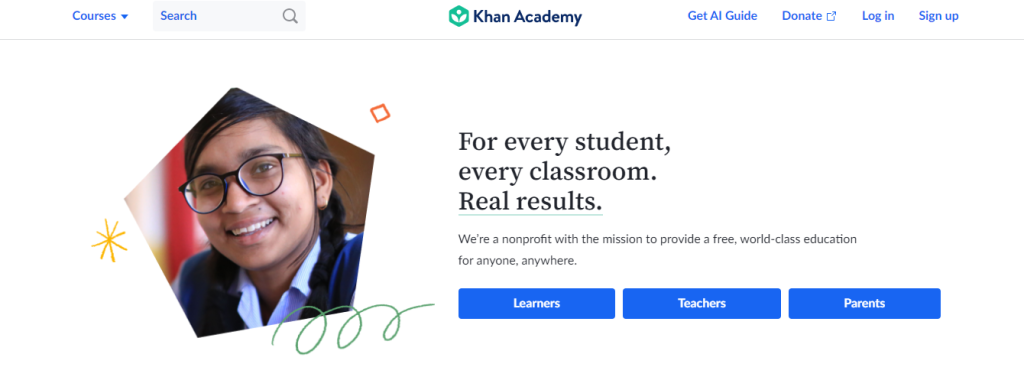
Khan Academy is a non-profit organization that provides free, high-quality educational content in a variety of subjects, from math and science to history and art. It’s an excellent resource for students of all ages.
Khan Academy is a non-profit educational organization that provides free online resources and courses on a wide range of subjects, including mathematics, science, computer programming, history, art, and more. It was founded by educator Salman Khan in 2008 with the mission of providing accessible, high-quality education to anyone, anywhere.
Prices:
Khan Academy is primarily known for its free access to educational content. However, they also offer a premium service called Khan Academy Plus, which is a subscription-based plan.
- Khan Academy Plus: This subscription service provides some additional features, such as an ad-free experience, downloadable content for offline access, and early access to new features. the cost was approximately $20 per month or $100 per year.
Pros:
- Free Access to High-Quality Education: Khan Academy offers a vast library of educational content for free, making it accessible to learners worldwide.
- Diverse Subject Coverage: It covers a wide range of subjects, including mathematics, science, humanities, and more, catering to learners of different interests and academic needs.
- Adaptive Learning: The platform uses adaptive technology to personalize learning paths for students, allowing them to progress at their own pace.
- Self-Paced Learning: Students can learn at their own speed and review materials as needed, which is beneficial for those who require more time to grasp concepts.
- Interactive Exercises and Assessments: Khan Academy provides interactive exercises and quizzes that help reinforce learning and assess comprehension.
- Available on Multiple Platforms: The platform can be accessed through web browsers and mobile apps, making it convenient for learners to access content from various devices.
Cons:
- Limited Advanced Content: While Khan Academy offers a strong foundation in many subjects, it may not provide the depth required for advanced or specialized studies in certain fields.
- Lack of Live Interaction: Unlike traditional classrooms or some other online platforms, Khan Academy does not offer live interaction with instructors or peers.
- Limited Subject Offerings in Some Areas: While the core subjects like math and science are well-covered, some niche or specialized subjects may not be available.
- Khan Academy Plus Subscription: While the premium subscription offers additional features, some users may find the cost prohibitive, especially when compared to the extensive free content available.
5. LinkedIn Learning (www.linkedin.com/learning)

Formerly known as Lynda.com, LinkedIn Learning offers a vast library of courses taught by industry professionals. It’s a valuable resource for developing skills relevant to today’s job market, such as leadership, project management, and software proficiency.
LinkedIn Learning is an online platform that offers a wide range of courses and tutorials on various topics related to professional development, business, technology, creative skills, and more. It’s designed to help individuals acquire new skills, advance their careers, and stay updated with the latest industry trends.
Prices:
- Monthly Subscription: Typically priced around $29.99 per month, this plan gives users unlimited access to the entire course library.
- Annual Subscription: This option offers a discount for users who commit to a yearly subscription. Prices may vary, but it’s often around $239.88 per year.
- Premium Subscription (Includes LinkedIn Premium): This premium plan, which includes access to LinkedIn Premium features like InMail messages and advanced job insights, may cost around $59.99 per month.
- Business and Enterprise Plans: For organizations, LinkedIn Learning offers plans tailored to the needs of teams and businesses. Pricing varies based on the number of users and specific features required.
Pros:
- Diverse Course Library: LinkedIn Learning provides a vast library of courses covering a wide range of topics, from technical skills to soft skills, leadership, and more.
- High-Quality Content: Courses are created and curated by industry experts, ensuring high-quality and up-to-date content.
- Flexibility: Users can learn at their own pace and on their own schedule, making it convenient for professionals with busy lifestyles.
- Integration with LinkedIn: It’s seamlessly integrated with LinkedIn, allowing users to showcase their completed courses on their profiles, which can be beneficial for job seekers.
- Certifications: Some courses offer certificates of completion, which can be added to a LinkedIn profile or resume to demonstrate proficiency in a specific skill.
Cons:
- Subscription-Based Model: Some users may find the subscription pricing model expensive, especially if they only need occasional access to courses.
- Dependence on Internet Connection: Users need a stable internet connection to access the courses, which may be a limitation for individuals in areas with limited connectivity.
- Limited Interactivity: While some courses have quizzes and exercises, the platform may not offer the same level of interactivity as live workshops or classes.
- Focused on Professional Development: While it offers a broad range of topics, LinkedIn Learning may not be the best platform for more specialized or academic subjects.
6. Skillshare (www.skillshare.com)

Skillshare is a creative-centric platform that offers courses in design, illustration, photography, and more. It’s perfect for individuals looking to explore their artistic side or refine their creative skills.
Skillshare is an online learning platform that offers a wide range of courses in creative fields such as design, photography, writing, illustration, and more. Founded in 2010, Skillshare provides a space for both professionals and hobbyists to develop new skills and enhance their creative talents.
Prices:
Skillshare offers both free and premium memberships:
- Free Membership:
- Access to a limited selection of courses.
- Ad-supported content.
- No offline viewing.
- No access to class projects or downloadable resources.
- Premium Membership:
- Unlimited access to the entire course library.
- Ad-free experience.
- Ability to download classes for offline viewing.
- Access to class projects, assignments, and downloadable resources.
- Community forums and networking opportunities.
Pros:
- Diverse Course Catalog: Skillshare offers a wide array of courses covering various creative disciplines, ensuring there’s something for everyone.
- Affordable Premium Membership: Compared to other online learning platforms, Skillshare’s premium membership is reasonably priced, making it accessible to a broad audience.
- Project-Based Learning: Courses on Skillshare often include projects or assignments, allowing students to apply what they’ve learned in a practical context.
- Community and Networking: The platform facilitates interactions between learners, enabling them to collaborate, share feedback, and connect with like-minded individuals.
- Offline Viewing: Premium members have the option to download classes and watch them offline, which is beneficial for those with limited internet access.
Cons:
- Limited Focus: Skillshare primarily emphasizes creative fields. If you’re looking for courses in other areas like technical skills or academic subjects, you may need to explore other platforms.
- Quality Varies: Since anyone can become a teacher on Skillshare, the quality of courses may vary. It’s advisable to read reviews and explore the instructor’s credentials before enrolling.
- No Accreditation: Skillshare doesn’t offer formal degrees or certifications. While courses can enhance skills, they may not carry the same weight as a degree from a traditional educational institution.
- Ongoing Subscription: To access premium content, a subscription is required, which means a recurring monthly or yearly cost.
7. Codecademy (www.codecademy.com)
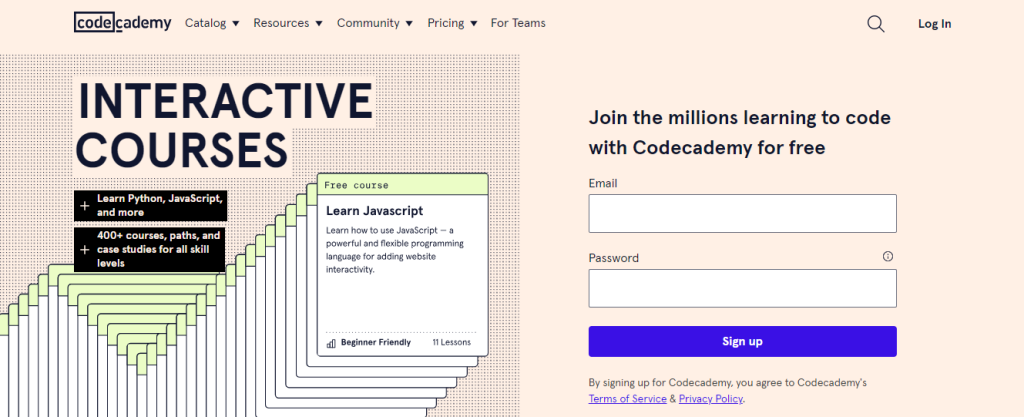
As the name suggests, Codecademy is an ideal platform for anyone interested in learning to code. It provides interactive, hands-on courses in various programming languages and web development.
Codecademy is an online platform that offers interactive coding courses to help individuals learn various programming languages and technologies. It is designed for beginners and aims to make coding accessible and engaging through hands-on projects and step-by-step tutorials.
Prices:
- Free Plan:
- Access to basic courses and limited features.
- No cost required.
- Pro Plan:
- Monthly Subscription: $19.99 per month.
- Annual Subscription: $15.99 per month (billed annually at $191.88).
- Unlimited access to all courses, projects, and quizzes.
- Personalized learning paths and progress tracking.
- Real-world projects and certificates upon completion.
Pros:
- Interactive Learning: Codecademy provides a hands-on learning experience through coding exercises, which helps reinforce understanding.
- Wide Range of Languages: It offers courses in a variety of programming languages including Python, JavaScript, HTML/CSS, Ruby, SQL, and more.
- Structured Curriculum: Courses are organized in a logical sequence, making it easy for beginners to progress from basic to more advanced concepts.
- Projects and Challenges: Students get the opportunity to work on real-world projects and challenges, which helps in applying theoretical knowledge.
Cons:
- Limited Depth: While Codecademy provides a solid introduction to coding, it may not cover more advanced or specialized topics in as much depth as some other resources.
- Dependence on Platform: Some users might find it necessary to supplement Codecademy with additional resources or courses to gain a more comprehensive understanding of certain subjects.
- Lack of Hands-on Projects in Free Plan: The free plan offers limited access to hands-on projects and features, potentially limiting the learning experience.
- Subscription Cost: The Pro Plan comes with a subscription fee, which might not be feasible for everyone.
8. Duolingo (www.duolingo.com)
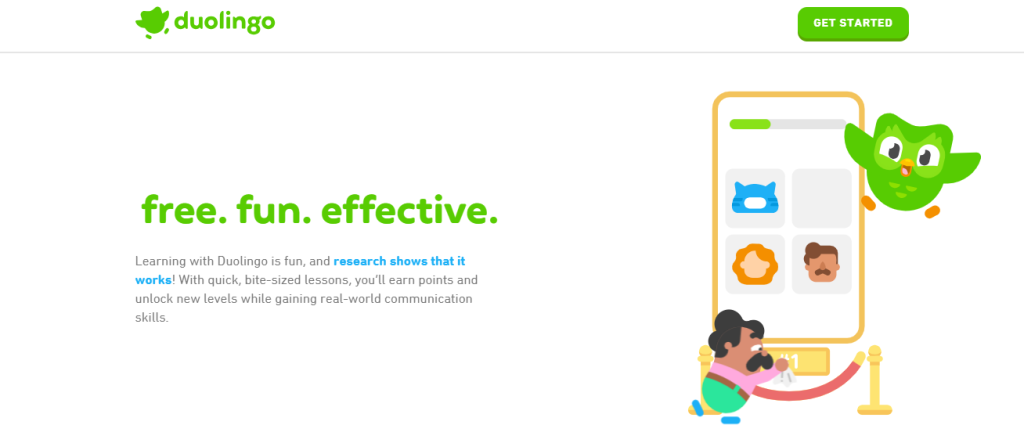
Duolingo is a popular language-learning platform that offers courses in over 30 languages. Its gamified approach makes language learning engaging and effective, making it a great choice for beginners and intermediate learners.
Duolingo is a popular language learning platform that provides a gamified and interactive approach to learning new languages. Founded in 2011, it has gained widespread popularity for its user-friendly interface and accessibility across various devices.
Prices:
- Free Version:
- Access to core features.
- Ad-supported.
- Limited offline access.
- Duolingo Plus (Paid Subscription):
- Ad-free experience.
- Offline access to lessons.
- Progress tracking and quizzes.
- Unlimited hearts (no restrictions on mistakes).
- Priority customer support.
- Costs approximately $6.99 per month.
Pros:
- Gamified Learning: Duolingo incorporates game-like elements to make learning engaging and enjoyable.
- Accessibility: Available on various platforms including web, iOS, Android, and Windows, making it convenient for users with different devices.
- Free Version Available: Offers a basic version with access to core features at no cost.
- Wide Language Selection: Provides a diverse range of languages to learn, catering to a global audience.
- Structured Curriculum: Offers a structured path for learners, starting from basic to more advanced levels.
- Community and Social Features: Allows users to connect with other learners, join clubs, and participate in discussions for added motivation and support.
Cons:
- Limited Depth for Advanced Learners: While Duolingo is excellent for beginners and intermediate learners, it may not provide the depth required for advanced proficiency in a language.
- Overemphasis on Translation: Some users feel that Duolingo’s exercises, particularly in the earlier stages, focus too heavily on translation rather than practical communication skills.
- Lack of Cultural Context: Duolingo may not always provide a comprehensive understanding of cultural nuances associated with the language.
- Monolingual Approach: The platform primarily uses the target language, which can be challenging for complete beginners who may need some explanations in their native language.
- Subscription Cost: While the free version is available, some advanced features and an ad-free experience are only accessible through the paid subscription.
9. Pluralsight (www.pluralsight.com)
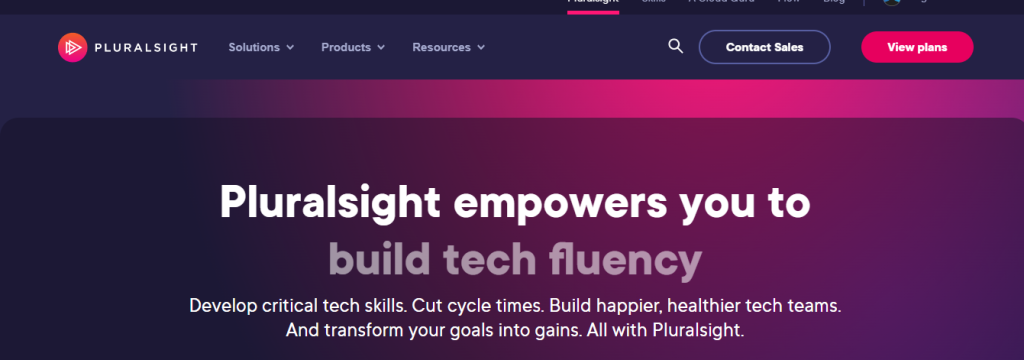
Pluralsight focuses on technology-related courses, making it an invaluable resource for IT professionals, software developers, and anyone interested in the tech industry. The platform covers a wide range of topics, from cybersecurity to data science.
Pluralsight is an online technology-focused learning platform that offers a vast library of courses, primarily aimed at IT professionals, software developers, and creative designers. It provides a wide range of high-quality video-based tutorials and assessments covering various topics, including software development, IT operations, data science, cybersecurity, and creative skills like graphic design and video editing. Pluralsight is designed to help individuals and organizations stay up-to-date with the latest technologies and advance their skills in a rapidly evolving digital landscape.
Prices:
Pluralsight offered different subscription plans:
- Individual Plans:
- Monthly Subscription: Typically priced around $29 per month.
- Annual Subscription: Usually priced around $299 per year.
- Business Plans: These are tailored for teams and organizations. Pricing depends on factors like the number of licenses and specific features required. Businesses need to contact Pluralsight for a customized quote.
Please note that prices may have changed since my last update, so I recommend visiting Pluralsight’s official website for the most current pricing information.
Pros:
- Extensive Course Library: Pluralsight boasts a vast collection of courses covering a wide range of technology-related topics, ensuring learners have access to a diverse set of learning resources.
- High-Quality Content: The courses are well-produced with high-definition videos and often taught by industry experts or experienced professionals, providing learners with quality education.
- Learning Paths and Assessments: Pluralsight offers learning paths that guide learners through a series of courses to achieve specific skill objectives. Additionally, it provides assessments to gauge a learner’s progress and understanding.
- Hands-On Labs and Projects: Some courses come with hands-on labs and projects, allowing learners to apply their knowledge in a practical, real-world context.
- Mobile-Friendly: The platform is accessible via web browsers and has a mobile app, enabling learning on the go.
Cons:
- Subscription-based Model: Some individuals may find the subscription pricing model a bit steep, especially if they only need occasional access to courses.
- Focused on Technology and IT: While excellent for IT professionals and developers, the platform may not cater as extensively to learners seeking non-technical or non-creative skills.
- Limited Free Content: The free trial provides limited access, and Pluralsight doesn’t offer a substantial amount of free content compared to some other platforms.
- Lack of Live Support: Unlike some competing platforms, Pluralsight does not provide live support or mentoring options for learners who may need additional guidance.
10. TED-Ed (ed.ted.com)

TED-Ed is an extension of the widely popular TED Talks, providing a platform for educators to create and share interactive lessons. It’s a fantastic resource for anyone looking for thought-provoking, educational content.
TED-Ed is an educational platform that aims to amplify the voices of educators and learners worldwide. It is an extension of the renowned TED Talks, which focuses on spreading ideas through short, powerful talks. TED-Ed provides a platform for teachers to create and share interactive lessons, animations, and educational content.
Prices:
- Free Access: TED-Ed offers a range of free resources, including a library of educational videos, lesson plans, and interactive activities.
- TED-Ed Clubs: Joining a TED-Ed Club is free. It’s a program that supports students in discovering, exploring, and presenting their big ideas.
- TED-Ed Educator: This is a free program for educators where they can join a global community, get access to specialized resources, and participate in professional development opportunities.
- TED-Ed Professional Development: Specific pricing for professional development workshops and courses can vary. It’s advisable to visit the TED-Ed website or contact them directly for current pricing.
Pros:
- Global Community: TED-Ed provides access to a diverse global community of educators, learners, and thought leaders, fostering connections and collaborations.
- Quality Content: The platform offers high-quality educational videos and resources curated from experts across various fields.
- Engaging Lessons: Educators can create interactive and engaging lessons using TED-Ed’s platform, which helps make learning more dynamic and enjoyable for students.
- Inspirational Talks: TED-Ed features talks from influential speakers on a wide range of topics, which can be used to stimulate discussions and critical thinking in the classroom.
- TED-Ed Clubs: These provide a structured framework for students to develop public speaking skills, critical thinking, and idea presentation.
Cons:
- Limited Depth: While TED-Ed provides a vast array of topics, the content may not always go into great depth on any single subject.
- Cost for Professional Development: While many resources are free, some of the professional development opportunities may come with a cost.
- Not a Comprehensive Curriculum: TED-Ed is a supplementary resource and may not replace a comprehensive curriculum in some educational settings.
- Possible Variability in Content Quality: Since TED-Ed allows educators to create and upload content, the quality of lessons may vary.
Conclusion
The e-learning landscape has never been more diverse and accessible than it is today. These ten websites offer a range of high-quality courses and resources, catering to learners of all interests and skill levels. Whether you’re looking to upskill for your career, explore a new hobby, or simply expand your knowledge, these platforms are sure to provide a rich and fulfilling learning experience. So, don’t hesitate to dive in and embark on your e-learning journey today!

